Paul Kent: State of Origin eligibility debate reaches flashpoint but misses point on series meaning
Critics argue that change to Origin is inevitable but one thing is for certain, if you mess with the fabric of what makes it a success, you’re headed down a dangerous path, PAUL KENT writes.
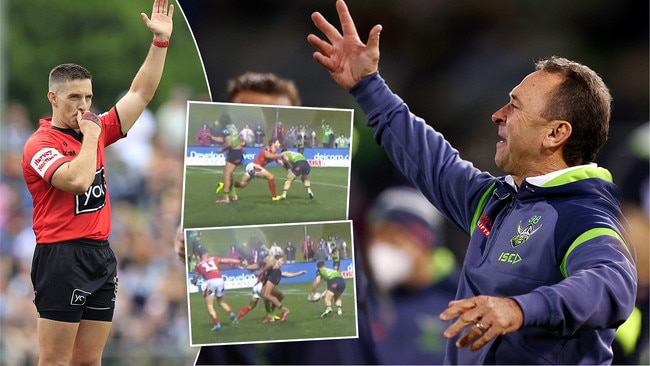
Opinion
Don't miss out on the headlines from Opinion. Followed categories will be added to My News.
Nobody dares suggest a little chilli powder only enhances Colonel Sanders’ 11 secret herbs and spices.
Beethoven’s Fifth sounds no better with a flute solo somewhere in the middle, despite modern support for the flute.
On a similar theme nobody knows what was in the magic dust that got sprinkled on State of Origin that night in July 1980 when Arthur Beetson ran out with chalk dust on his chest, hands wrapped like a prizefighter, and found a formula that would become the shiny jewel in the rugby league landscape.
Yet times change and, as happens, some are beginning to suggest changes to Origin to enhance the game or, heaven forbid, make it better.
It is in the news again after NSW winger Brian To’o, while getting ready to play for the Blues against Queensland next week, confirmed he wants to play for Samoa in the upcoming Rugby League World Cup despite being short odds to be picked for Australia.
Australia coach Mal Meninga is already on record as not being a fan of Origin players making themselves unavailable for the Kangaroos, so this is what they call a flashpoint.
Stream every game of every round of the 2022 NRL Telstra Premiership Season Live & Ad-Break Free During Play on Kayo. New to Kayo? Start your free trial now >
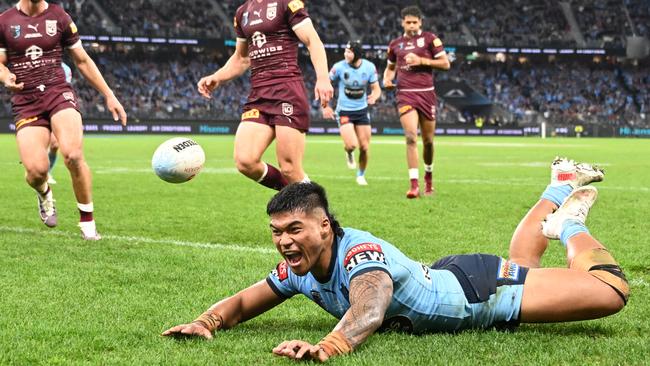
The popular solution for many is to open it up to everybody, to make Origin once again the best of the best, like it was when somebody had the grand idea to create an All Star game with the best from Australia, New Zealand and England to play against our very own Indigenous All Stars.
It would be like Origin, only better.
Except it wasn’t.
Perhaps hidden in the secret formula of Origin was that nobody cared about the names, as such, but about what they did.
Hardly anybody from NSW knew who Wally Lewis was when he ran out for Queensland in that first Origin game at Lang Park. Few know he actually ran out at lock.
Mal Meninga was a young unknown having his 20th birthday, which got mentioned more than once in the commentary, given not a lot else was known; Chris Close was a centre from Wynnum, read the biography, looked kind of chubby, and that was about it.
Most of the early press was about Beetson and Rod Reddy and Kerry Boustead and the few others playing in the Sydney competition who originally hailed from Queensland finally turning out for the Maroons.
Nobody expected what happened next.
Ignoring their absent reputations they went out and, because they were playing for Queensland, and because they believed in Queensland and because they felt aggrieved at some injustice that might or might not have actually happened, they delivered a performance that cast the Origin legend.
They won, they believed, because they were Queenslanders.
It was a narrative that continues today, even if it seems you need only to eat a banana nowadays to qualify as a Queenslander.
Maybe the change isn’t to open Origin criteria, but to tighten it.
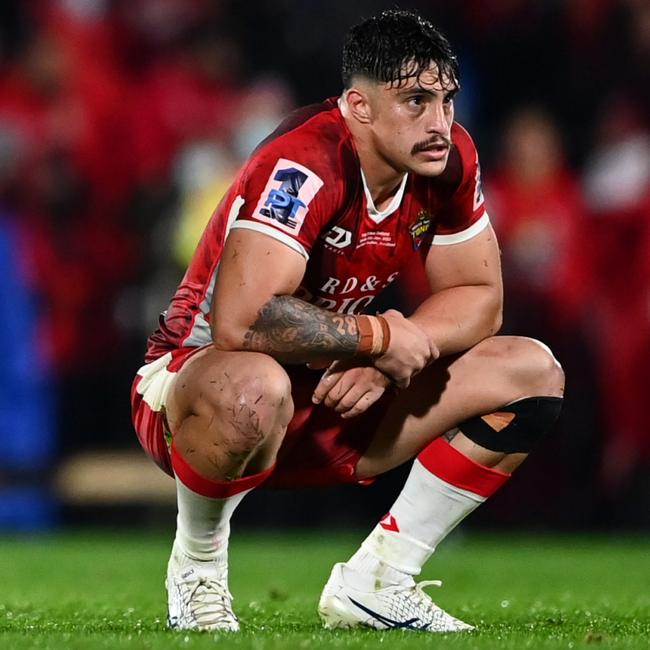
Broadening the eligibility criteria can only introduce a higher quality of player to the Origin arena but it also risks messing with a formula that works for no other reason, to explain it, than to say it does.
When the World Cup is over in November the International Rugby League will meet somewhere in December and already on the agenda will be the status of emerging nations Tonga and Samoa. If not Fiji and Papua New Guinea.
Tonga and Samoa are considered strong chances to be elevated to tier one status to put them alongside Australia, New Zealand and England.
And it would mean players currently splitting their allegiances between Origin and their heritage nations might no longer have the call.
At its heart the tier system was established to protect State of Origin from New Zealand and England players. That was its intention, clear and deliberate.
It protected the original intention that the Origin game was there as a pathway to Australian selection.
The Pacific nations were categorised as tier two, emerging nations essentially, which allowed the cute little loophole that NRL players could play State of Origin and if they missed selection for the Kangaroos they could still play for their heritage nation.
This helped the development of the Pacific nations like Tonga and Samoa, which can now only be argued was a tremendous success.
In recent years Tonga has beaten Australia and New Zealand in Tests and now fields a team chosen entirely from NRL players, with some spice.
The development has worked, and continues.
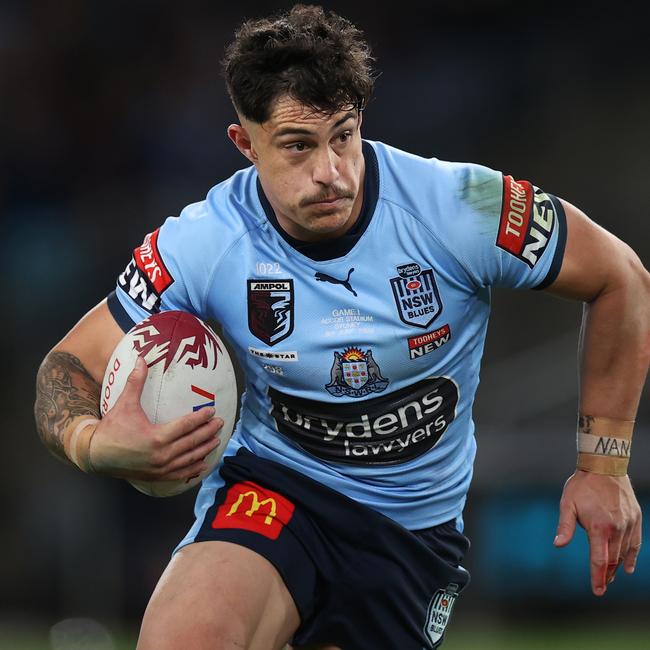
Some will say change to Origin is inevitable, though, with the massive growth of Polynesian players in the NRL and the rolling logic that eventually there will be too many to ignore.
But the NRL also needs to be careful, with its reputation for tinkering with concepts until it eventually breeds disinterest.
The Sevens were a carnival, a new frontier for the game, until it began to be tinkered with and everybody stayed home.
The same happened with the Nines. With the mid-week competition well before that.
The All Star game has been reshaped and now shipped off to Rotorua for next season.
Origin works for reasons nobody can properly explain but it was never simply an All Star game in blue and maroon jerseys.
It stood for something deeper than that.
Kent annihilates refs’ ‘lack of courage’
The Raiders copped another apology on Monday.
That’s four points in apologies the NRL owes the club which the betting markets suggest they are no chance of retrieving, even though all these apologies are beginning to clutter the corners.
The first came when Matt Lodge dived like a Spanish midfielder against the Raiders in late April and the referee recognised it for what it was, a solid 9.5, minus the Hungarian judge, and called play on.
He wasn’t going to be fooled.
But then the video referee looked up from his sudoku and, with the advantage of replay to which he clearly pays no attention, told the referee it must be a penalty and the Warriors kicked the goal that sent the game into golden point, which they then won 21-20.
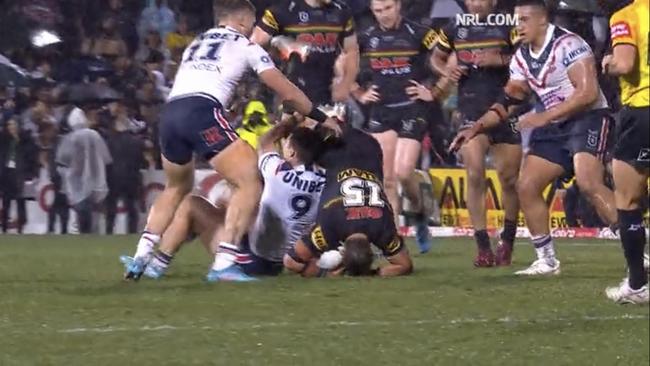
The video referee got sacked for his shocking error, which mattered little to the Raiders.
Now, eight rounds later, it has happened again.
Two shocking decisions from referee Peter Gough in the final seconds that saw St George Illawarra hold on to win 12-10 when, at least, it should have gone into golden point.
Sadly the Raiders were not the only club sinned against over the weekend.
The Roosters also had significant cause to question the competency of referee Gerard Sutton that they believe cost them a victory, which is harder to prosecute but with equal grounds.
The concern for the NRL is that in both incidents over the weekend the referee got it wrong because of a profound lack of understanding for the game.
Sam Verrills did not put Scott Sorensen in a dangerous position, which Sutton penalised him for and which led directly to Viliame Kikau’s try.
In truth, Verrills put Sorensen in no position. He lost position himself and Sorensen ran into him and simply folded over him.
Referee Gerard Sutton blew it.
Combine that with the Angus Crichton sin bin, which wasn’t a sin bin, and the constant six agains that seemed to go far too often Penrith’s way and not for the Roosters and it leaves the league struggling to explain why its referees are so out of touch with the game.
Suddenly, everything the NRL was working towards, all those years of public education and spin, collapsed in one weekend.
Both referees showed no situational awareness.
Under pressure, Gough failed to recognise that when Ben Hunt and Jack Bird were laying all over Joe Tapine as the Raiders pressed the tryline with seconds left that they were not simply guilty of a holding down in the tackle, which constituted the six again call that he awarded, but were committing a professional foul.
The scoreboard and time left on the clock revealed that.
He then failed to adjudicate that Hunt failed to stand square at marker which is why he was able to get to Tom Starling at dummy-half and end the game.
Gough panicked and, under pressure, failed.
Sorry, Raiders.
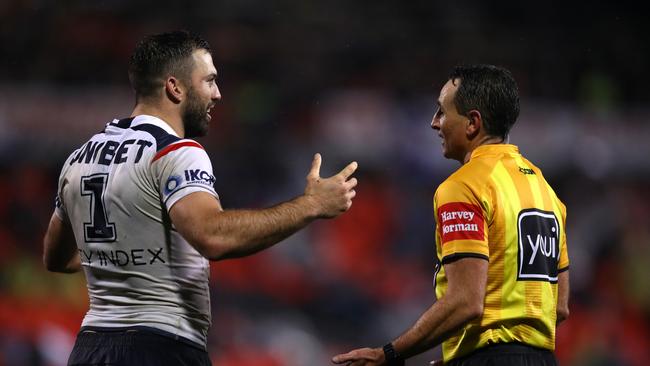
So much education has gone into the referees to deliver consistency and accuracy, with more than a little touch of game awareness, and yet last weekend exposed it as a wasted exercise.
So much is going into the referee’s ear they are losing all touch for the game.
While there have been various calls made on how to fix it, like a ruck referee, or a return of the second referee, neither addresses the true issue of human error.
For all the expense, the referees are no better now than they ever were, at least in the crucial incidents.
The other great worry is the broken rules system.
The six-again rulings introduced several years back to replace the outright penalty, in a bid to artificially quicken the game, have created a bizarro world situation where it is more advantageous for the defence to deliberately break the rules than adhere to it.
Hunt and his Dragons recognised that and exploited it.
Every weekend other teams do the same.
For such reasons it is a bad rule and, for what benefits it has brought the game, it still has to go.
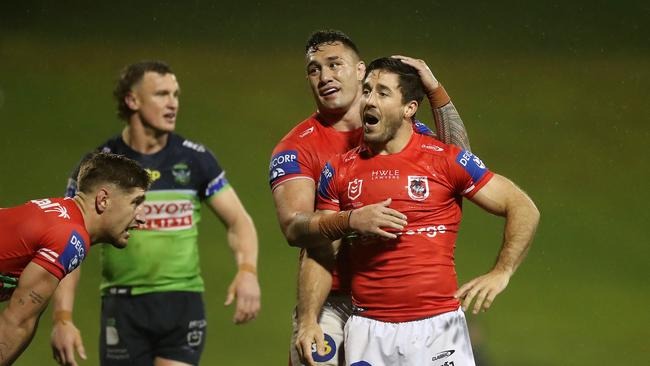
It is a by-product of the lack of intelligence and courage from within, with the NRL unable to trust the referees to get it right, and knowing the coaches are continually coaching against the rules, so they feel the need to continually introduce new variations of the law to cover for the lack of control — and support — of the referees.
It is a sad state all around.
It was the Raiders and Roosters last weekend, but whose turn this weekend?
The Raiders sit 11th and, the way it is going, will be line ball whether they make the finals this season.
Give them the four competition points they have been robbed, though, and they would be outright eighth and feeling a whole lot more secure in their season.
In a game where already three coaches have been sacked this season for their team’s low standing on the ladder, and where another is currently battling to survive, such decisions really are life changing.
Ricky Stuart will keep his head attached to his shoulders because the Raiders’ footy club has enough nous to understand how severely they have been robbed.
So will Trent Robinson at the Roosters, who finds himself in the unusual position of battling to make the eight, currently alongside the Raiders on 14 points.
They will save their jobs but, for two men so invested in winning, the apologies make little difference.
Originally published as Paul Kent: State of Origin eligibility debate reaches flashpoint but misses point on series meaning




